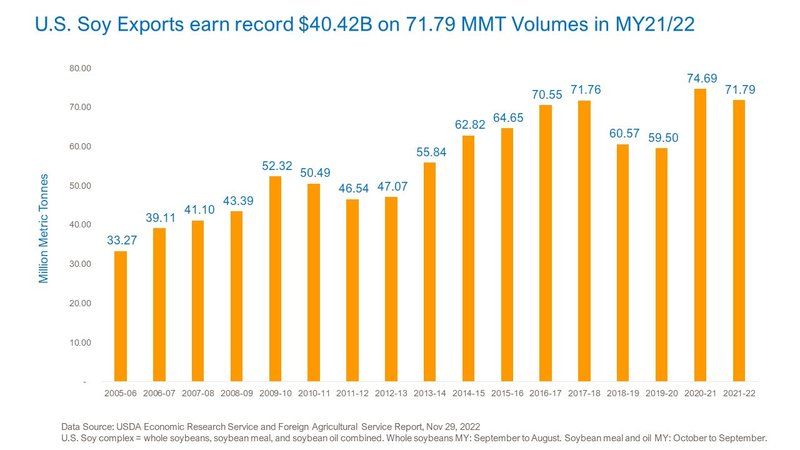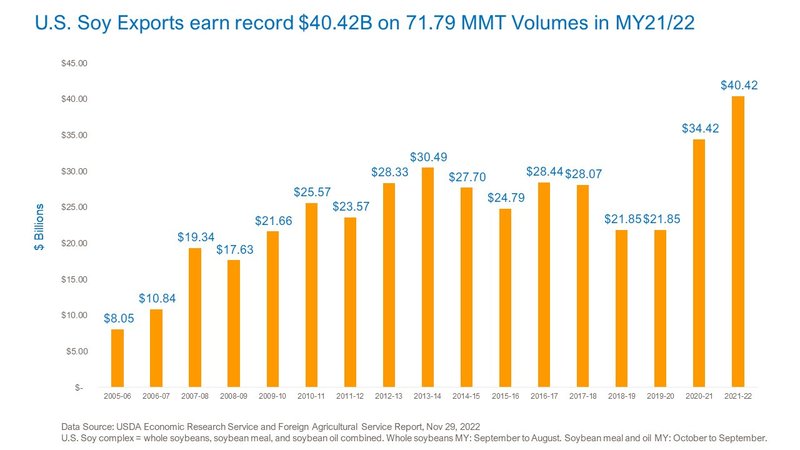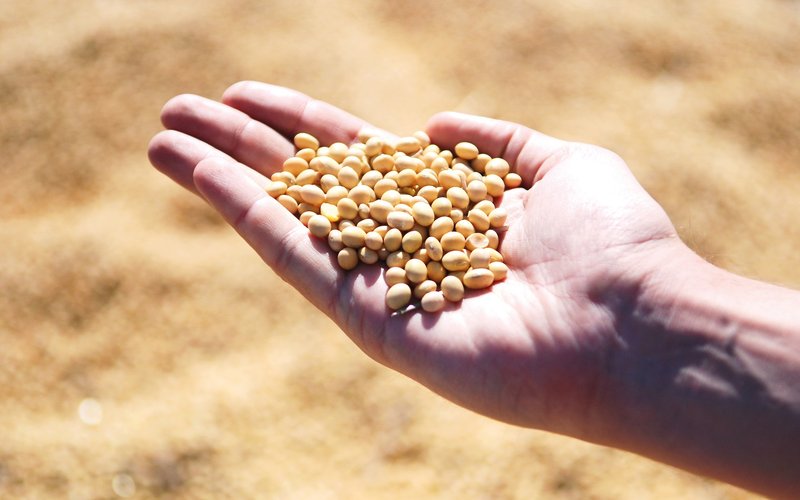U.S. Soy’s combined exports (whole soybeans, meal, and oil) achieved a record value of USD 40.42 billion for the marketing year (MY) 2021/22, up 17% year-on-year. Export volumes reached 71.79 million metric tons (MMT), the second-highest on record, according to the USDA Economic Research Service and Foreign Agricultural Service.
While year-on-year export value grew 17% and volume dipped 4%, long-term growth continued with value growing 50% and volumes up 6.3% on a five-year average. This reaffirms the success of USSEC’s strategic plan to differentiate, elevate preference, and attain market access for U.S. soy to advance nutrition, climate-forward solutions, and progress for people and communities.
Strong performance across U.S. soy products
Whole soybean export volumes at 58.72 MMT were 7.8% higher than the five-year average, with China, the EU and Mexico being the top three markets. Soybean meal export volumes at 12.69 MMT were 1.6% higher than the five-year average with the Philippines, Mexico, and Colombia being the top three markets. Soybean oil export volumes at 804,272 MT were 22.7% lower than the five-year average with India, South Korea, and Mexico being the top three markets.
“Despite the unprecedented impact of COVID-19, conflict, and climate events, I am proud of the value delivered for all our stakeholders,” said Jim Sutter, USSEC CEO and Chairman of U.S. Agriculture Export Development Council. “We expect to see these challenges continuing in MY 22/23 including economic contraction and inflation. Yet we are confident that when companies and countries choose sustainable solutions, collaborate, and advance open trade, together we can create positive impact.”
MY 21/22 saw double-digit volume growth in emerging and expansion markets including Mexico 11%, Egypt 52%, Ecuador 23%, Venezuela 58%, Turkey 1908% (post lifting of restrictions), Tunisia 44%, Algeria 204%, Nepal 15%, and India 184%.
U.S. soy innovation, sustainability, services, and collaboration deliver solutions
A commitment to innovation, sustainability, service, collaboration, consistent investment and long-term impact ensured the soy checkoff continued to create value for all its stakeholders.
For example, in MY 21/22, the U.S. Soybean Export Council (USSEC) launched the U.S. Soy Delivers Solutions marketing campaign in 14 languages to drive increased customer preference for U.S. Soy’s advantages in the animal nutrition, aquaculture, oil and soyfoods sectors. USSEC leveraged soy checkoff funding and scientific research findings that soybean meal derived from U.S. soybeans delivered the optimal nutritional bundle, better animal performance, and superior value versus soy of other origins. USSEC also launched the Soybean Value Calculator, an innovative tool that calculates the economic advantage of soy from various origins. In aquaculture, the In-Pond Raceway System continued to see uptake. In oil, the High Oleic Soy Sourcing Guide was launched, and the Specialty U.S. Soy Database saw rising usage.
As consumers, companies and countries seek increasing actions on sustainability and transparency, the U.S. Soy Sustainability Assurance Protocol (SSAP) was enhanced to enable customers to transfer SSAP certificates up to four times while keeping records of sustainable U.S. Soy purchases and report progress on Environmental, Social and Governance (ESG) goals.
In MY 21/22, SSAP verified shipments grew 42% year-on-year, touching record volumes of 40.25 MMT and constituting a record 58% of total U.S. Soy exports. Additionally, the “Sustainable U.S. Soy” and “Fed with Sustainable U.S. Soy” labels saw increased adoption on 850+ product packs.
“As farmers, we have a deep commitment and responsibility to nourish the world sustainability. MY21/22 marks another successful year for the soy checkoff, with record high value and the second-highest ever export volumes. This is largely attributable to the soy checkoff’s sustained investment and commitment to delivering solutions that create long-term value for all our stakeholders,” said Doug Winter, USSEC chairman, USB director, and Illinois soybean farmer.
Global poultry, pork and aquaculture consumption are forecast to grow 17.8%, 13.1%, and 23%, respectively, by 2030.















